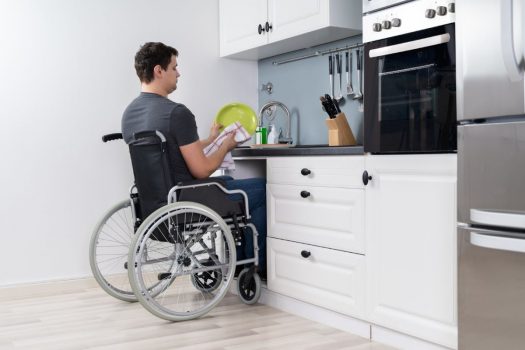
The daily life of Samantha, a 15-year-old girl with cerebral palsy, will be made easier with the addition of a ramp to the front of her home, and also richer and more fulfilling.
Samantha will have easier access to her day care program, where she has friends and can socialise. Relationships are one of the most meaningful aspects of a fulfilling life, especially for a teenager.
She’ll also be able to get to and from her physiotherapy sessions, where she receives important treatment to improve flexibility and movement which she needs to operate her wheelchair.
An NDIS home modification will change not only Samantha’s life but also the lives of her family and the local community.
Her father John will no longer have to lift his daughter’s wheelchair – highly unsafe – up and down the front steps so she can be at day care and he can be at work.
He’ll no longer have to put his health and job in jeopardy, not to mention the wellbeing of his family and the local community, where he’s involved as a sports coach and sits on the school council.
You can see that in supporting people with different physical abilities, home modifications are important in underpinning the wellbeing and independence of whole families and communities. While there are many supports that can help you,
What are some other home modifications?
Home modifications are changes to the structure, layout or fittings of a participant’s home so they can safely access and move around comfortably in areas they frequently use.
As in Samantha’s case, major modifications include structural changes to a home, such as ramp and lift installations and changes to bathrooms and kitchens.
Minor modifications can include small, low-cost aids and equipment to improve accessibility, such as customised bed blocks, built in bath seats, hand-held showers, chair platforms, grab rails, and light switch and power point relocations.
As a participant in the National Disability Insurance Scheme, home modifications can be included in your plan if:
- You or your carers can’t access frequently used rooms and spaces in your home
- Your home has adverse impacts on the sustainability of current living and care arrangements
- A qualified occupational therapist has performed an assessment and recommended them
Depending on your goals and needs, home modifications can be combined with other supports such as exercise physiology services to help you manage your condition.
How participants can access home modifications
Under the NDIS, evidence is required to decide which home modifications are needed in a participant’s plan.
A qualified occupational therapist can carry out a functional capacity assessment for NDIS home modification. They can inspect your home to ascertain if a home modification is necessary and if so what type of modification will meet your goals and future needs.
For instance, you may have trouble showering because the shower is located above the bath. A modification such as creating a separate shower recess would significantly improve shower access and the individual’s overall safety and independence with showering tasks.
In some circumstances, supports related to home modifications can also be funded, such as short-term rent if you need to move out of your home during building works.
Once an occupational therapist has completed their assessment and have decided that you’re in need of a home modification they will make a recommendation for funding.
If and when the funding is approved – and standard modifications and fittings are generally funded – you’ll be able to go ahead with the modification and gain greater independence and quality of life.
If you would like further information or to speak to us, please contact our friendly concierge service on 1800 238 958 or complete the request contact form and we will contact you at a time that suits you best.

